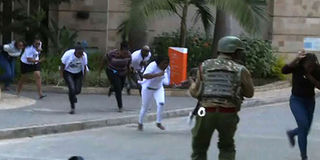Terrorism is just a crime, do not suspend rights, create extra laws

People run away from the scene of a terrorist assault at Dusit complex in Nairobi on January 15, 2019. PHOTO | RAPHAEL AMBASU | AFP
What you need to know:
- Terrorism also has taken the centre stage in geopolitics, where it offers a pre-packaged excuse to wage war against countries considered rogue or part of the “Axis of Evil” in the recent past
- The law equally has the potential of interfering with separation of powers.
- The deliberate refusal to give terrorism a definition separate from any other type of violent crime is primarily to guard against the departure from human rights principles that protect criminal suspects.
The recent UN counter-terrorism conference in Kenya came at a crucial time. Anti-terrorism measures employed in the country have raised issues of abuse of human rights by the State in the guise of fighting terrorism.
Kenya has, undoubtedly, been caught up in the global terrorism menace and has every right to act to counter and prevent terror attacks — but at what cost to citizens?
Claims have been raised of extrajudicial killings and disappearances in areas with large Muslim or Arab populations, such as North Eastern and the Coast. Madrasa (Islamic religious schools) have also been targeted in the quest of fighting radicalisation.
The chilling summary killings of Sheikhs Aboud Rogo and “Makaburi”, two vocal Imams in the coastal streets, equally posit the concern as to how terrorism suspects or sympathisers are dealt with.
HUMAN RIGHTS
What, then, justifies extra laws, unnecessary measures and suspension of human rights when it comes to fighting terrorism, when, in all legal sense, we are essentially dealing with a violent crime like any other?
There is no consensus on the definition of terrorism in international law. It is deemed that the distinction of terrorism from other crimes, such as ‘transnational crime or any violent crime’, for instance, is driven more by political motive than any substantive legal argument.
Ideological warfare has been the hallmark of counter-terrorism measures so far. That explains why some governments have used anti-terrorism laws to silence those opposed to their regimes.
Terrorism also has taken the centre stage in geopolitics, where it offers a pre-packaged excuse to wage war against countries considered rogue or part of the “Axis of Evil” in the recent past.
The description of Nelson Mandela as a terrorist at the height of the ANC’s fight against apartheid in South Africa by then-UK Prime Minister Margaret Thatcher is a classic example of how the term can easily be abused by those in power.
The deliberate refusal to give terrorism a definition separate from any other type of violent crime is primarily to guard against the departure from human rights principles that protect criminal suspects. The key factors include the rights to trial, legal representation and life and protection against torture.
TIPPING POINTS
It was, therefore, highly commendable for UN Secretary-General Antonio Guterres, in his remarks at the UN conference in Nairobi, to cite State violence and abuse of power as the “final tipping points that lead to terrorism”.
Mr Guterres went on to say that, “while extremism could not be justified, the world must acknowledge it does not rise in a vacuum”. He cited human rights violations and bad governance as some reasons that trigger radicalisation.
His sentiments are timely in reviewing how States have responded to terrorism. It is incumbent on our country to also reconsider how it has dealt with terrorism. Kenya needs to hold a mirror to itself and ask whether it, indeed, acted ultra vires and needed to soften its stance while pursuing anti-terrorism goals.
The concerns raised by communities that have borne the brunt of overzealous anti-terrorism measures have raised claims that need to be given serious consideration to re-establish trust between them and the police.
The amended Prevention of Terrorism Act 2019, which gives extra powers to the Counter-Terrorism Centre, is stifling and will lead to many gray areas in anti-terrorism policy. Civil society groups are, rightly, against it as it will curtail their work and shrink further the space communities and NGOs require in helping to combat terrorism.
ALIENATING COMMUNITIES
The law equally has the potential of interfering with separation of powers. It will affect the uniform approach required by the criminal justice system to preserve parameters of human rights laws. The system has enough legal instruments to assist it to fight terrorism and the State could rely on those.
Unnecessary extra measures and laws will only expand the window of human rights abuses that we must keep firmly shut to protect those who are wrongly accused.
Again, the government risks alienating the communities whose support they need to succeed in this quest. Suspending human rights through extrajudicial killings and disappearances and minimising the space for the civil society is not the best model of policing terrorism. Bringing in many actors as counter-terrorism agents blurs the lines and has the potential of leading to human rights violations.
Whatever it does, the government must ensure that anti-terrorism policies do not end up encouraging radicalisation rather than dissuade it, as alluded to by the UN secretary-general. Enforcing the existing criminal laws in the fight against terrorism is the right path to follow.
Ms Guyo is a legal researcher. [email protected] @kdiguyo





